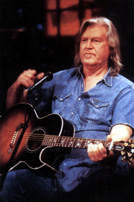




 |
 |
 |

Comment
on this story
What:
Billy Joe Shaver w/ John Cowan Band, Jay Clark and the CCstringband, Garage Deluxe and Dixie Dirt
When:
Saturday, Oct. 16, 3-9 p.m.
Where:
Brewers’ Jam, World’s Fair Park
Cost:
$25 gate, $10 for under 21 and non-drinkers
|
The Outlaw Kind
Billy Joe Shaver finds peace in the wake of hardship
by Matthew Everett
Billy Joe Shaver met Waylon Jennings for the first time at a country music festival in Dripping Springs, Texas, during the Fourth of July weekend in 1972. Shaver and a few other songwriters were in a trailer, passing a guitar around and singing songs.
“I started playing ‘Willy the Wandering Gypsy and Me,’ and Waylon came busting in there,” Shaver says, recalling the encounter from a motel room in Arkansas. “He was high on God knows what and asked, Whose song is that?’ I told him it was mine, and he said, ‘By God, I’m going to record that.’ ... Well, I took him at his word, and I went up there [to Nashville] and chased his ass around for six months.”
The pair finally met again, at the RCA studios in Nashville where Jennings was working on a new album. Jennings was locked in a fight with RCA executives over control of his albums—he wanted his concert band to play on his records and to turn his back on the slick, commercial songs favored by Nashville at the time in favor of the kind of material that would soon define the Outlaw movement. Shaver’s appearance at the studio was one of the most significant events in kicking off that movement.
But it didn’t seem that way when Shaver cornered Jennings in the studio hallway. Shaver walked right up to Jennings and reminded him, in a not-so-gentle way, of their previous meeting in Dripping Springs.
“[H]e took me in a room and said, ‘Look, hoss, that ain’t the way you do things,’” Shaver says. “He told me to play my songs, and if he didn’t like them he’d tell me to stop. I don’t remember exactly what I played. But I got to ‘Honky Tonk Heroes,’ and he looked kind of bewildered. He said, ‘Dammit, I know what I’m supposed to do.’ He scrapped what he was doing and started recording my songs.”
The result was Honky Tonk Heroes, released in 1973. Nine of the 10 songs on the record were written or co-written by Shaver, and at least half of them—the title track, “Old Five and Dimers (Like Me),” “Ride Me Down Easy,” “Ain’t No God in Mexico,” and “Black Rose”—are now classics of Outlaw country. Jennings won his fight with the studio, the Outlaw movement took hold, other people began recording Shaver’s songs, and Shaver finally got a Nashville contract of his own.
It hadn’t been easy for Shaver up to that point. He was born in Corsicana, Texas, in 1939, raised by his grandmother after his parents abandoned him as an infant, dropped out of school to work on his uncle’s farm, lost the tips on all four fingers of his right hand in a saw mill accident, and struggled as a songwriter—and it didn’t get much easier. Hard living was a basic principle of the Outlaws, and Shaver lived as hard as any of them. Other people had more success with his songs than he did, and he stayed outside the spotlight while Jennings, Willie Nelson and Kris Kristofferson reaped the biggest commercial rewards of the Outlaw movement.
He kept recording, though, and in the early ‘80s his son Eddy joined his band as a guitarist. It was a fruitful relationship, with Eddy’s slash-and-burn country blues adding a hard edge to Shaver’s tough songs. By the mid-‘90s, they were recording as a band, under the name Shaver, and comfortably straddled the gap between Nashville and the ascendant alt-country scene. Then disaster piled on: Shaver’s mother died in early 1999, and his wife Brenda died just a few months later. On Dec. 31, 2000, Eddy was found dead in hotel room of a drug overdose. Shaver himself suffered a heart attack on stage in 2001.
“I thought God was taking me right there, in the oldest honky tonk in Texas,” he says.
But he made it, and last year he and producer Tony Colton revisited a batch of old solo recordings Eddy had made more than 10 years before. “I was having dreams of Eddy appearing, wanting something, but I didn’t know what it was,” Shaver says. “Tony said he was sure it was those masters that they’d done in 1991 or ‘92. So we dusted them off and cooked them and baked them up to snuff. It was spooky. Spooky but good. It took me a long time to be able to look at pictures [of Eddy]. But the years have passed, and it’s been long enough that I’m able to do it now.”
The new album is called Billy and the Kid. Most of the songs came from those old sessions, with Shaver adding vocals to a few tracks and recording the new song “Fame.” Eddy’s playing on the record is looser and bluesier than on the Shaver albums of the ‘90s. “It’s a load off my shoulders that I’ve done this,” Shaver says. “I really wanted everybody to hear how good he was. I loved him very much, and I miss him a lot. But I’ve got Jesus in my heart and I know where he went.”

October 14, 2004 • Vol. 14, No. 42
© 2004 Metro Pulse
|
|